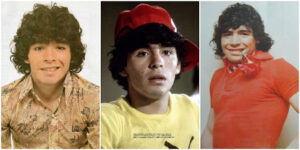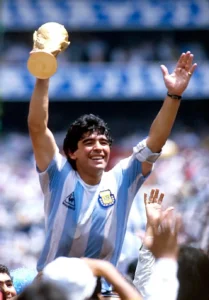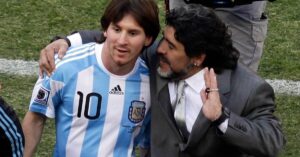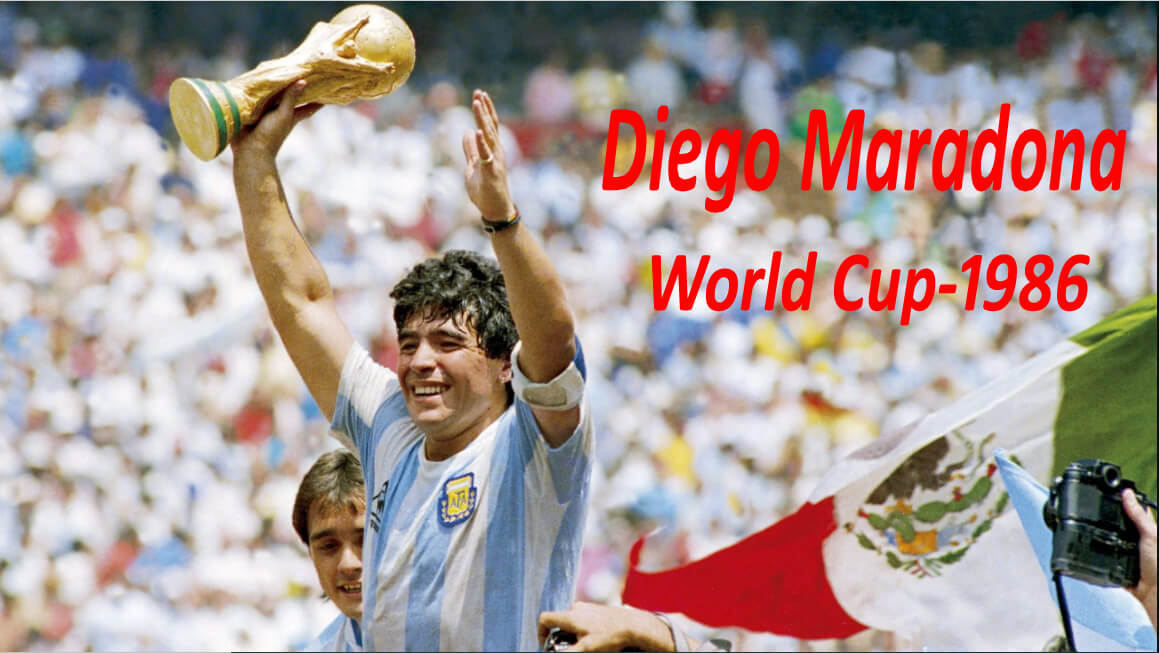Diego Armando Maradona, an enigma of football, a magician with the ball at his feet, and a larger-than-life personality, is a name that reverberates through the annals of sports history. Born on October 30, 1960, in the Lanús district of Buenos Aires, Argentina, Maradona’s life is a testament to his extraordinary talent, his undying passion for the game, and the highs and lows that come with fame and adulation.

Early Life and Humble Beginnings: Maradona’s story begins in Villa Fiorito, a poverty-stricken neighborhood on the outskirts of Buenos Aires. Raised in a large family with limited resources, Diego found solace and purpose in football. From a young age, he showcased a unique aptitude for the sport, dribbling his way through narrow alleyways and honing his skills on the rough streets. His talents didn’t go unnoticed, and by the age of eight, he was already a part of Los Cebollitas, a youth team affiliated with Argentinos Juniors.
Rising Star at Argentinos Juniors: Maradona’s time at Argentinos Juniors marked the early stages of his ascent to football greatness. He made his professional debut for the senior team at the age of 16, captivating spectators with his incredible ball control, lightning-fast footwork, and innate understanding of the game. His agility, combined with an audacious playing style, set him apart from his peers. It wasn’t long before he was affectionately nicknamed “El Pibe de Oro,” a tribute to his exceptional talent.
Boca Juniors and National Team Debut: In 1981, Maradona transferred to Boca Juniors, one of Argentina’s most illustrious football clubs. His time at Boca was marked by electrifying performances and a deep connection with the fans. However, it was on the international stage that Maradona truly made his mark. He represented Argentina in the 1982 FIFA World Cup, showcasing glimpses of his brilliance. Despite his young age and limited exposure to global audiences, Maradona’s potential was undeniable.
The 1986 World Cup Triumph: The year 1986 would forever etch Maradona’s name in football folklore. Leading Argentina in the FIFA World Cup held in Mexico, Maradona produced a series of performances that bordered on the divine. In the quarter-finals against England, he scored two of the most iconic goals in football history. The infamous “Hand of God” goal, where he used his hand to deflect the ball into the net, was followed by the mesmerizing “Goal of the Century,” a solo effort that showcased his dribbling prowess and artistic vision.
Maradona’s leadership and extraordinary skill guided Argentina to their second World Cup victory, with a 3-2 triumph over West Germany in the final. He scored five goals and provided five assists during the tournament, rightfully earning the Golden Ball award for the best player. Maradona had transcended mere athletic achievement; he had become a global phenomenon.

Clubs and Controversies: Maradona’s club career was a journey filled with both triumphs and controversies. His move to Barcelona in 1982 was met with immense expectations, and he delivered stellar performances. However, internal conflicts and injuries led to a relatively short-lived stint at the club. In 1984, Maradona embarked on a new chapter by joining Napoli, an Italian club in need of revival.
At Napoli, Maradona’s impact was transformative. He lifted the club from relative obscurity to unprecedented success. Under his captaincy, Napoli won their first Serie A titles in 1987 and 1990, along with a UEFA Cup in 1989. The city of Naples adored Maradona, and he reciprocated the affection, becoming a symbol of hope and inspiration. However, his time in Italy was also marked by off-field controversies, including alleged connections to criminal organizations and struggles with substance abuse.
The Unforgettable Exit and Later Years: Maradona’s playing career began to wane in the early 1990s due to injuries and his well-documented personal battles. He returned to Argentina, playing for Newell’s Old Boys before a brief stint in the Argentine Primera División. His final match as a professional took place in 1997, marking the end of an era in football.
After retiring from playing, Maradona transitioned into coaching and management, mirroring the passion and intensity he displayed on the field. His managerial endeavors were marked by a mix of successes and challenges, reflecting his complex personality and the expectations that followed his name.
Diego Maradona, One Of The Greatest Soccer Players Of All-Time, Dies So 60
The Argentine, who won the World Cup in 1986 and played for Boca Juniors, Napoli, Barcelona, and Sevilla, is reported to have suffered a heart attack in his native Buenos Aires. He had been recovering from a brain blood clot surgery earlier this month.

He leaves a complicated legacy behind. On the field, he was arguably the greatest player ever to kick a ball, and certainly in the top two together with the Brazilian, Pele. Few can match his achievements: His performances in the 1986 World Cup, in which he almost single-handedly carried Argentina to victory, made him a near-deity in his homeland, while his time at Napoli, in which he took the club from mediocrity. to Italian champions and UEFA Cup winners, has raised him to similar heights.
But off the field, Maradona continually fought addiction problems and was kicked out of the 1994 World Cup after failing a drug test. During his time in Naples, he was continually linked to underworld figures from the Camorra crime group, while he was also accused of dodging the Italian taxman for decades.
Maradona and Messi
Diego Maradona and Lionel Messi share a special connection in the world of football, primarily rooted in their Argentine heritage, their exceptional footballing talents, and their mutual respect for each other’s abilities. While there isn’t an extensive history of personal interactions between the two, their relationship is marked by admiration and a shared understanding of the pressures and responsibilities that come with being considered among the greatest football players of all time.
1. Shared National Identity: Both Maradona and Messi hail from Argentina, a country with a deep and passionate love for football. In Argentina, football is more than just a sport; it’s a cultural phenomenon that shapes lives and communities. This shared nationality serves as a common bond between the two players and contributes to their connection.

2. Footballing Legends: Maradona and Messi are widely regarded as two of the greatest football players in history. Maradona’s legacy was established through his exceptional performances, especially during the 1986 World Cup. Messi, on the other hand, has dominated the football scene for over a decade, breaking numerous records and winning multiple awards. The two players’ status as footballing icons provides them with a unique perspective on the sport.
3. Public Acknowledgment: Both players have publicly acknowledged each other’s skills and contributions to football. Messi has often expressed his admiration for Maradona, stating that Maradona’s 1986 World Cup win was a source of inspiration for him. Maradona, in turn, has praised Messi’s talent and impact on the modern game. This mutual admiration has helped foster a positive relationship between the two players.
4. National Team Ties: Messi and Maradona also share a connection through their involvement with the Argentine national team. Maradona coached the national team during the 2010 World Cup, where Messi was a key player. While their time together during that tournament was short, it created a link between them in the context of representing their country on the global stage.
5. Similar Pressures and Expectations: Both Maradona and Messi have experienced the intense pressures that come with being Argentine football superstars. They’ve shouldered the hopes of an entire nation and have been subject to comparisons and critiques throughout their careers. This shared experience of living under the spotlight and meeting high expectations likely contributes to their mutual understanding and respect for each other.
It’s important to note that while Maradona and Messi share a connection, they are also unique individuals with their own distinct paths, styles, and contributions to the sport. Their relationship is one of respect and admiration, and while they may not have had an extensive personal relationship, their bond as footballing legends and representatives of Argentina ensures that they will always be linked in the annals of football history.

The Last Whistle: On November 25, 2020, the football world was shaken by the news of Diego Maradona’s passing. At the age of 60, he left behind a legacy that transcends the sport itself. His death was met with an outpouring of grief from fans, fellow players, and dignitaries around the world. Maradona’s influence was felt not only through his on-field brilliance but also through his larger-than-life persona and his impact on pop culture.
Diego Maradona’s journey is a tale of unparalleled talent, unrelenting determination, and human frailty. His legacy lives on in the hearts of those who witnessed his magic and the generations he inspired. He remains an enduring symbol of football’s ability to inspire, captivate, and touch lives across borders and cultures. As time marches on, Maradona’s name will continue to shine as a beacon of greatness, forever etched in the annals of the beautiful game’s history.
